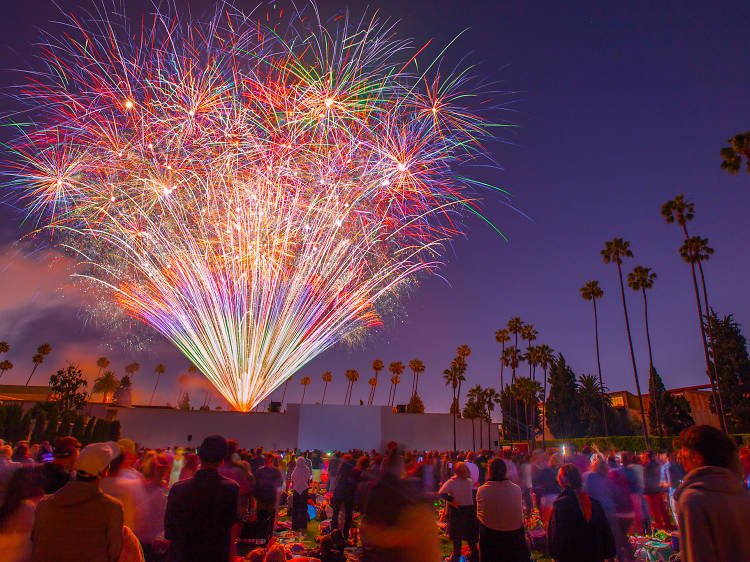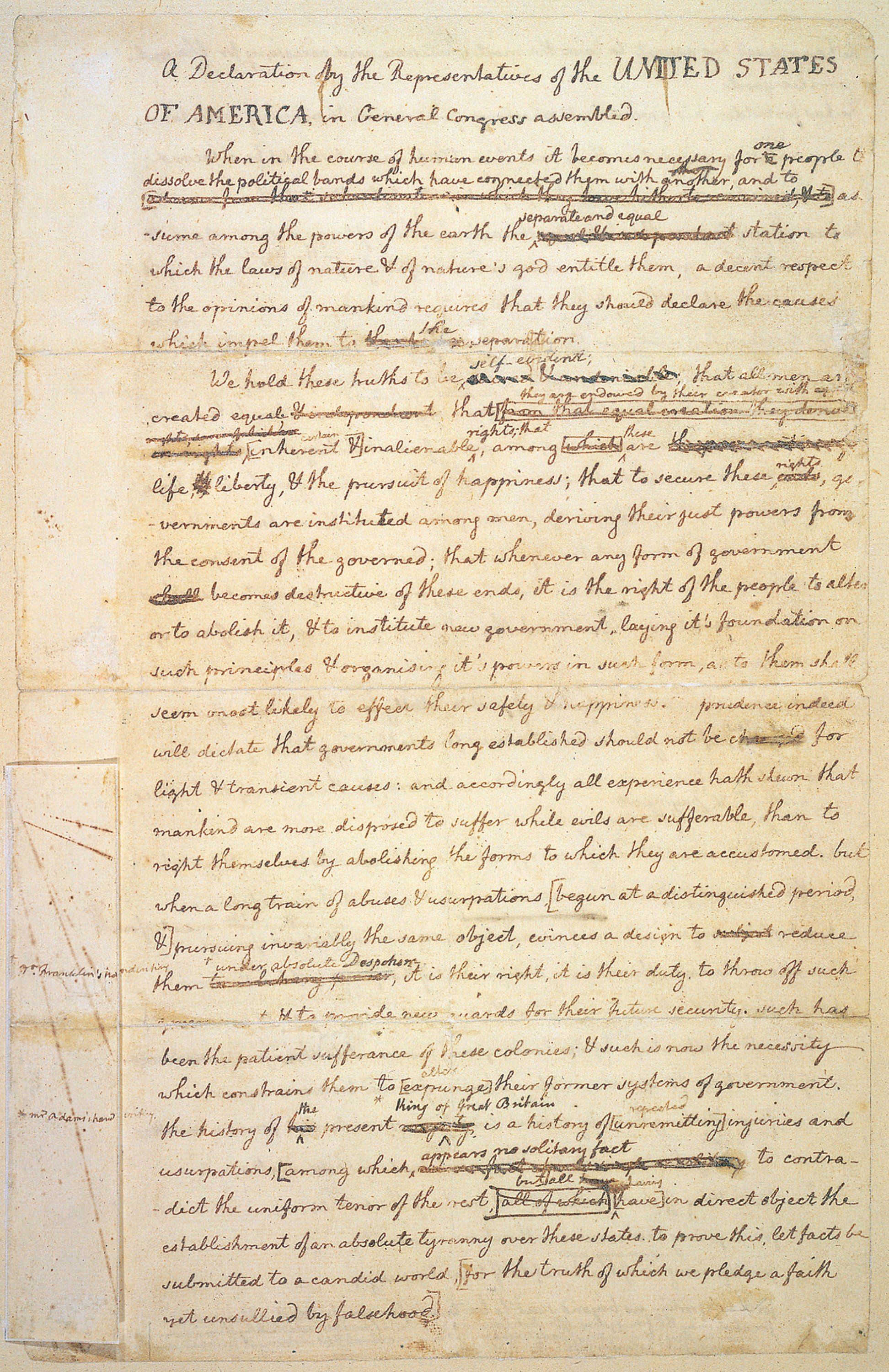#944: Jefferson Monroe Levy, the 4th of July, and US
The Fourth of July 2023 isn’t even close to what it was - or even meant to be - back when Erica (my “slightly older sister”) and I were kids. Back in the late fifties and early sixties, what we nowadays simply call either “The Fourth” or “Fourth of July Weekend” (even if it comes around on a Tuesday, Wednesday or Thursday) meant going to the Van Nuys/Sherman Oaks War Memorial Park (where we learned to swim and dive as well as attend day camp in the summer) take a blanket, sandwiches and a thermos-full of lemonade - and watch the best-staged, most artistic fireworks display anywhere in the West. How did we know it was “the best in the West?” Simple: when you live within a couple of miles of the best “special effects” departments on earth, it’s bound to be great . . . and incredibly loud. Having the world’s tallest palm trees as a backdrop . . . well, it just couldn’t be any better. And to top everything off, there would be the singing of the Star Spangled Banner by some star of the silver screen, usually backed by an orchestra from MGM, Paramount, Fox or even (G-d forbid!) RKO.
Those were the days! It was both patriotic (remember, there were veterans of WWI, WWII and the Korean “police action” scattered throughout the crowd) and filled with pride for the country that our Founders had created. Oh sure, we knew we weren’t perfect and not everyone was as acceptable as others (these were still the pre-Civil Rights Act days and Hollywood was not yet free of the horrendous “Black List”); but in the main, we still celebrated the dreams and ideals of our Founders. We were still, for the most part “WE THE PEOPLE.”
Even as a kid of 8 or 9, I reveled in the thought that we, the Stone family, descended from the Schimbergs and Greenbergs of Maryland and Virginia, and the Kagans and Hymans of Minnesota and Illinois, were all part of the U.S., which we always pronounced as the single word: “us.” We were among the few whose grandparents and great-grandparents neither spoke Yiddish nor had ever never set foot in New York. And yet, we certainly never felt ourselves to be more of “US” than those who were of the first generation . . . either in America itself or Hollywood in general.
In the generations of our grandparents, great-grandparents and even more, the Fourth of July was far, far different than what Erica and I remember. While I have read about fireworks being a staple of 19th-century Fourth of July celebrations (signifying the “bombs bursting in air” at the battle of Ft. McHenry - a legacy of the War of 1812), it was the public reading of Jefferson’s magnificent “Declaration of Independence” which took center stage. These celebrations weren’t nearly as jingoistic (propagandistic) as those celebrations of a later age; rather they centered and brought to mind the words, thoughts and dreams of that most literate of all our Founders, Thomas Jefferson of Virginia. And even after Jefferson died (ironically on the 4th of July, 1826, the very same day as his colleague/political nemesis John Adams), his words - among the greatest in all human history - were kept in the ears and memories of a grateful public . . . US:
Jefferson’s handwritten draft
The unanimous Declaration of the thirteen united States of America, When in the Course of human events, it becomes necessary for one people to dissolve the political bands which have connected them with another, and to assume among the powers of the earth, the separate and equal station to which the Laws of Nature and of Nature's God entitle them, a decent respect to the opinions of mankind requires that they should declare the causes which impel them to the separation.
We hold these truths to be self-evident, that all men are created equal, that they are endowed by their Creator with certain unalienable Rights, that among these are Life, Liberty and the pursuit of Happiness.--That to secure these rights, Governments are instituted among Men, deriving their just powers from the consent of the governed, --That whenever any Form of Government becomes destructive of these ends, it is the Right of the People to alter or to abolish it, and to institute new Government, laying its foundation on such principles and organizing its powers in such form, as to them shall seem most likely to effect their Safety and Happiness. Prudence, indeed, will dictate that Governments long established should not be changed for light and transient causes; and accordingly all experience hath shewn, that mankind are more disposed to suffer, while evils are sufferable, than to right themselves by abolishing the forms to which they are accustomed. But when a long train of abuses and usurpations, pursuing invariably the same Object evinces a design to reduce them under absolute Despotism, it is their right, it is their duty, to throw off such Government, and to provide new Guards for their future security.--Such has been the patient sufferance of these Colonies; and such is now the necessity which constrains them to alter their former Systems of Government . . .
Jefferson Monroe Levy (1852-1924)
After serving two terms as POTUS (1801-1809), Jefferson returned to his estate at Monticello (Latin for Little Mountain), where he continued to live for the remainder of his life. For more than a quarter century, it was his habit to invite all the people from “down the hill” to attend his 4th of July celebration during which he read the Declaration of Independence from the very bookstand on which he drafted the original document. At the time of his death on the 4th of July, 1826, his estate was in severe disrepair; in 1831, the house and grounds were sold by Jefferson’s heirs (his daughter, Martha Jefferson Randolph and her son, Thomas Jefferson Randolph) to one James Turner Barclay, a Charlottesville pharmacist. Three years later (1834), Uriah P. Levy (1792-1862), the first Jewish Commodore of the United States Navy, bought the 218-acre estate from Barclay for $2,700 (equivalent to $79,100 in today's dollars). Commodore Levy then undertook to have the long-neglected home repaired, restored, and preserved. He also bought hundreds of additional acres that had been part of the plantation, to add to what was left. Levy, it should be mentioned, was part of one of the oldest and most prominent Jewish families in America.
Uriah P. Levy used Monticello as a vacation home. Toward the end of his life, the Commodore also restored the Charlottesville Town Hall, built in 1852, as a theater, and renamed it the Levy Opera House. This bold Greek Revival 800-seat structure is still in use today.
From 1837 to 1839, Uriah’s widowed mother, Rachel Levy, lived there fulltime until her death; she is buried along Mulberry Row, the main plantation street adjacent to the mansion (making her the only Jewish person buried on the grounds of Jefferson’s estate).
17 years after the Commodore’s death, Levy’s nephew, the patriotically-named Jefferson Monroe Levy (1852-1924), who was a successful three-term New York congressman, businessman, and lawyer, purchased Monticello at public auction for $10,500 (a little less than $312,200.00 in 2023 dollars. He owned, cared for and completely restored the mansion and its grounds until it was purchased by the Thomas Jefferson Memorial Foundation forty-four years later (1923). During the years he owned Monticello, Jefferson Monroe Levy poured nearly half-a-million dollars (over $15,000.000 in todays money) into the restoration of Monticello. Despite only using it as an occasional retreat, Jefferson Monroe Levy revived Thomas Jefferson’s 4th of July custom; on that date, the former Congressman would be there, among all the townies from nearby Charlottesville, to attend his reading of the Declaration of Independence . . . from the very same stand-up writing table-cum-podium upon which Thomas Jefferson had originally composed it.
There is far, far more to the Fourth of July than fireworks, hotdogs and beer, or sales at the local mall hyped and hawked by the likes of Washington, Jefferson, Franklin et al. (BTW, July 4, 1776 is not the date upon which the Founders signed the Declaration of Independence. In matter of historic fact, independence was formally declared on July 2, 1776, a date that John Adams believed would be “the most memorable epocha [sic] in the history of America.” On July 4, 1776, Congress approved the final text of the Declaration, but it wasn't signed until August 2 of that year.)
To me, the Fourth of July should serve as something akin to a “refresher course” in the miracle that is America; its founding principles and ideals, its historic promise, highs, lows and the many challenges and stumbling blocks which have always stood in the path of our Democratic Republic. For many of US, the promise of America is best and most succinctly expressed by the 3 Latin words which make up our national motto: e pluribus unum . . . i.e. “Out of many, one.”
America is unique among the nations of the world when it comes to combining pluribus - people of virtually all ancestries, origins, tongues, religions, histories native myths to make something brand new . . . unum - one people. This has long been our ideality - even when not precisely our reality. Throughout our relatively brief history (247 years and counting), we have accomplished great things as a Democratic Republic. We have also fought with one another, treated “others” as our enemies, sought to bar entry to those we feared or did not understand. We have been through generations when rights were greatly expanded and enjoyed, and times - like now - when rights have been contracted.
No one ever said that being part of US was going to be easy . . . or inexorable; indeed, it has always been a challenge. This was best summarized by Dr. Benjamin Franklin in 1787. According to James McHenry (1753-1816) a Maryland delegate to the Constitutional Convention, who throughout that convention, kept one of the best and most compendious journals of all the compatriots in Philadelphia. On the page where McHenry records the events of the last day of the convention, September 18, 1787, he wrote: “A lady asked Dr. Franklin ‘Well Doctor what have we got a republic or a monarchy? “A republic” replied the Doctor . . . if you can keep it.” (McHenry’s journal, by the way, is at the Manuscript Division of the Library of Congress.)
And so it is: We are US; a most unique breed. Not necessarily the best . . . just the most unique.
May we continue attempting to live up to - and expanding upon - the very best of the ideals our Founders bequeathed to US.
May this Fourth of July be happy, healthy and most importantly, energizing.
E PLURIBUS UNUM
Copyright©2023, Kurt Franklin Stone



